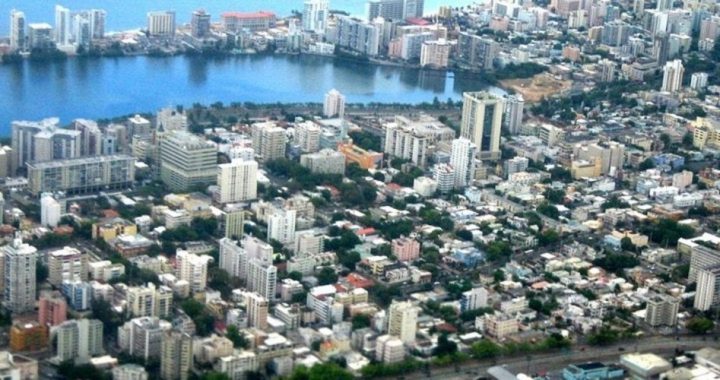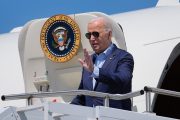
Despite a recent Economist/YouGov poll taken last month that found only 32 percent of Americans in favor of the admission of Puerto Rico as the 51st state, Puerto Rico’s Governor Ricardo Rossello is becoming increasingly aggressive in pushing for statehood.
Rossello, a Democrat, campaigned for office promising he would gain statehood for the territory (or commonwealth), and is pointing toward a recent poll of island residents in which 97 percent of those voting in a referendum favored statehood. The validity of that poll, however, is questioned because only 23 percent of the commonwealth’s registered voters voted in the referendum. Two of Puerto Rico’s main political parties boycotted the vote as a waste of time, arguing that statehood cannot be achieved until Congress grants it.
In an effort to force the hand of Congress in the matter (the U.S. Constitution gives plenary power to Congress in deciding whether to admit a new state into the federal Union), Rossello swore in a “congressional delegation,” consisting of two senators and five members for the U.S. House of Representatives. They plan to travel to the nation’s capital and demand to be seated as the official congressional delegation for the “state” of Puerto Rico.
Rossello cites the precedence of an action taken by Tennessee to gain admittance in 1796 as the 16th state, which has been referred to as the “Tennessee Plan.” While the actions of Puerto Rico’s governor in this matter bears some similarity to what Tennessee did, there are also some significant differences.
Tennessee had historically been part of the colony of North Carolina until the American Revolution. With the adoption of the Constitution in 1789, North Carolina had not yet ratified the Constitution, placing that state temporarily outside of the United States, and Tennessee a part of the independent state of North Carolina. When North Carolina joined the United States in 1790, with its ratification of the Constitution, it ceded the western land holding now known as Tennessee to the new federal government. Tennessee soon became part of the federal land known as the Southwest Territory.
Vermont and Kentucky had been part of the states of Massachusetts and Virginia, respectively, before their admission as states. Tennessee would eventually become the 16th state, the first created from a federal territory. Many in Congress were hesitant to grant statehood to Tennessee, so the territory tried to force the issue by holding a statehood convention and adopting a state constitution. They then elected two U.S. senators and sponsored elections for two members of the U.S. House of Representatives.
Congress soon allowed Tennessee into the Union, but voided the previous elections, requiring new elections for their congressional delegation.
In the case of Puerto Rico, however, the delegation has simply been appointed by the governor. In an apparent attempt to create a bipartisan support for statehood, Rossello named former Governor Carlos Romero Barcelo, a Democrat, and Zoraida Fonalledas, the national committeewoman for the Republican Party in Puerto Rico as the senators, while naming two Republicans, two Democrats and an independent as the members of the House of Representatives from the proposed state.
One serious problem with this approach, however, is that both senators and representatives must be elected by direct popular vote, according to the U.S. Constitution. While governors can choose senators in case of vacancies, the Constitution unmistakably requires House members to be chosen by popular vote. Because of this, these “House members” could not be seated legally.
A second concern is that Puerto Rico could be expected to be a reliably Democrat state, with two additional U.S. senators and, according to their present population, five representatives. All would be expected to add to the liberal make-up of Congress, in addition to adding what can be expected to be seven more Democrat votes to the Electoral College, which elects the president of the United States.
Another reason that many Americans could be expected to resist Puerto Rican statehood, at least for the present, is the enormous debt problem the island faces. The debt is $123 billion in bonds and unfunded pension liabilities, which, according to Forbes, is expected to top 107 percent of gross domestic product by next year.
Popular sentiment in Puerto Rico for statehood has grown since 1967, when only 39 percent supported it. At that time, 60 percent favored the continuation of commonwealth status. Less than one percent supported independence.
The entire issue of Puerto Rico’s status is a result of the decision of the United States to obtain an “empire” after the Spanish-American War. The United States received Puerto Rico, Guam, and the Philippines from Spain. At the time, some prominent American politicians, including William Jennings Bryan, the Democratic Party nominee for president in 1896 and 1900, cautioned Americans that they should immediately grant independence to these possessions — and not join European powers such as Great Britain and France in obtaining colonies.
Unfortunately, this wise counsel was not accepted, with many powerful interests in the United States favoring the taking on of imperial status. Now, we are having to deal with that decision as a nation.
The question of whether to admit Puerto Rico as a state, or grant it independence, should be made in the interest of what is best for the United States.
Photo of San Juan: Wikipedia
Steve Byas is the author of History’s Greatest Libels, which challenges some of the false accusations made against historical personalities from Christopher Columbus to Clarence Thomas.



